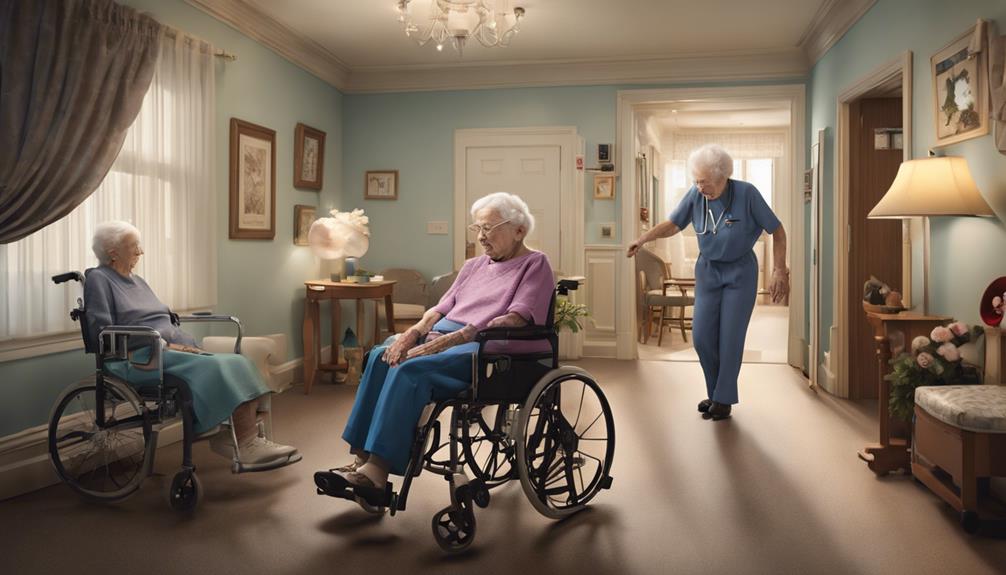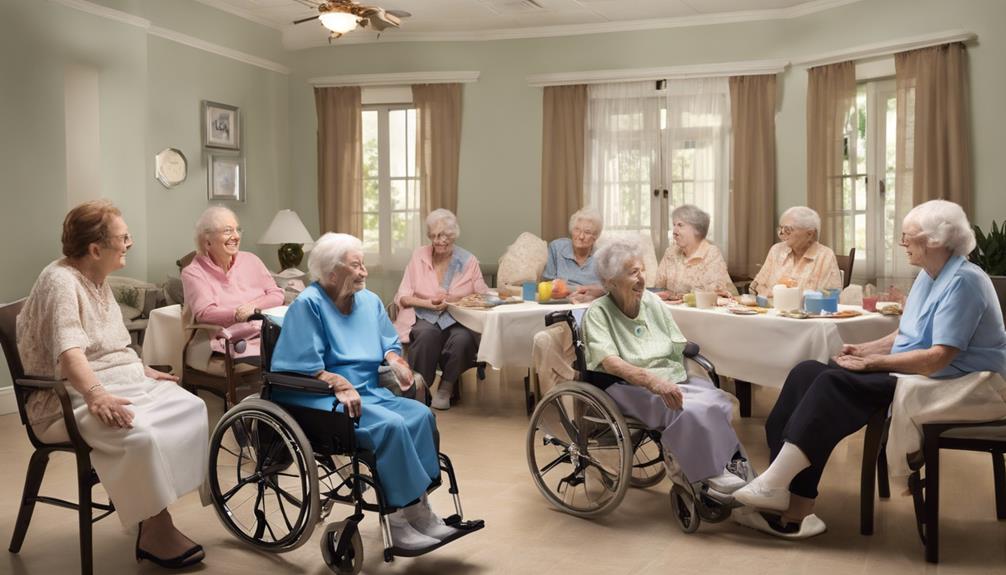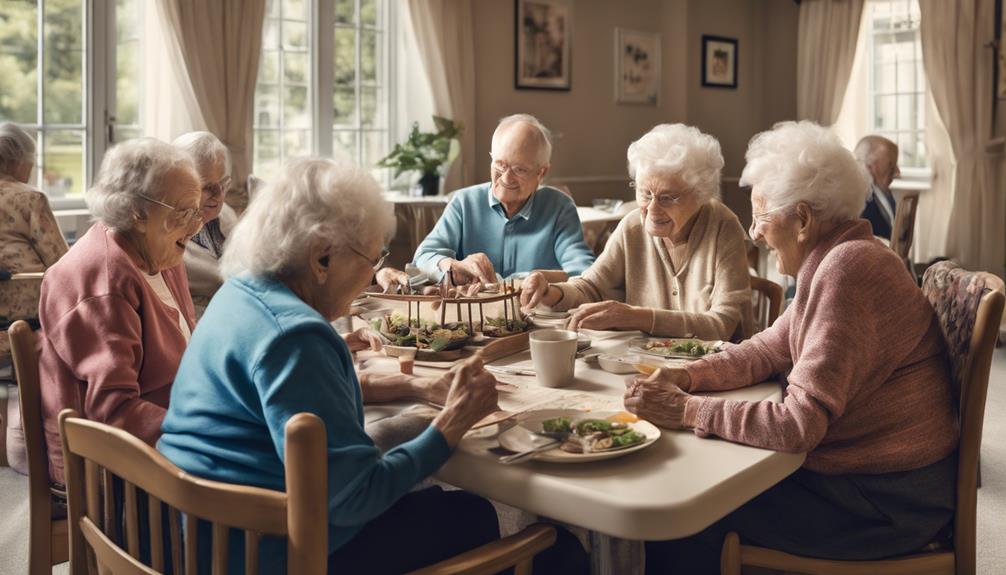In the realm of senior care, assisted living facilities frequently face a critical juncture, navigating the fine line between the social needs and healthcare requirements of their residents.
The complexities surrounding this issue are multifaceted, raising questions about the future of comprehensive care for our aging population.
As we delve into the nuances of the social model's impact on seniors, a deeper understanding is needed to address the evolving needs and complexities of our elderly loved ones.
Key Takeaways
- Personalized care crucial for seniors' well-being and independence.
- Staffing shortages impact quality of care and resident satisfaction.
- Social engagement vital for seniors' emotional health and fulfillment.
- Balancing safety, autonomy, and personalized care essential in senior living facilities.
The Social Model's Impact on Independence
In assisted living, the social model empowers seniors to maintain their independence and thrive within a supportive community environment. Seniors benefit from a rich tapestry of social activities that enhance their emotional well-being and overall quality of life. The emphasis on community living fosters a sense of belonging and connection among residents, promoting a holistic approach to care that goes beyond just physical needs.
Within this model, seniors are encouraged to participate in various social activities while still receiving the necessary support services for their daily living tasks. This balance between independence and support allows seniors to retain their autonomy while enjoying the benefits of a caring community. The social model recognizes the importance of individual preferences and choices, ensuring that each resident receives personalized care that meets their unique needs.
Balancing Safety and Autonomy

Striking a delicate balance between ensuring residents' safety and preserving their autonomy is a fundamental aspect of care in assisted living communities. In these settings, we prioritize personalized care that caters to the unique medical needs and preferences of each senior resident. Safety measures, such as fall prevention strategies and emergency response plans, are in place to provide peace of mind for both residents and their families. While safety is paramount, promoting autonomy is equally important. Residents are encouraged to maintain independence in their daily activities while receiving the necessary support and assistance.
Balancing safety and autonomy requires open communication and collaboration among residents, families, and care providers. By involving residents in decision-making processes and respecting their choices, we can create a supportive environment that fosters both safety and independence. Continuous assessment and adjustment of care plans are essential to ensure that the balance between safety and autonomy is maintained. In assisted living, our goal is to empower seniors to live confidently while receiving the care they need.
Promoting Social Engagement in Seniors
Maintaining a vibrant social life is crucial for the overall well-being and happiness of seniors living in assisted care communities. Social engagement plays a vital role in enhancing cognitive function, emotional well-being, and overall quality of life for older adults. By fostering social connections and reducing feelings of isolation through activities like group discussions, games, and outings, seniors can experience improved mood, self-esteem, and mental acuity. Engaging in community events and programs enables seniors to build friendships and establish a sense of belonging, contributing to a more fulfilling retirement experience. Creating a supportive social environment within assisted living facilities is key to promoting increased happiness and better mental health among seniors.
- Participating in group discussions and activities can enhance social connections.
- Going on outings and trips can reduce feelings of isolation and loneliness.
- Involvement in community events and programs helps seniors feel a sense of belonging and purpose.
Challenges in Staffing and Caregiving

Amidst the dynamic landscape of senior care facilities, the persistent challenge of staffing shortages continues to impact the delivery of quality care for residents. Reports from a September 2021 survey revealed that a staggering 82% of operators in assisted living facilities faced staffing shortages, resulting in instances of delayed assistance due to understaffing. The consequences of inadequate staffing levels are far-reaching, leading to concerns regarding burnout and frustration among caregivers striving to meet residents' needs effectively.
To address these challenges, it's crucial to prioritize training programs that equip staff with the necessary skills to provide high-quality care. Research underscores the importance of further exploring staffing requirements tailored to the unique demands of assisted living settings. Establishing appropriate ratios of health aides to residents is essential in ensuring comprehensive and timely care delivery, ultimately enhancing the overall quality of life for those in assisted living communities. By recognizing and addressing these issues, we can work towards creating environments where residents receive the care and attention they deserve.
Enhancing Quality of Life in Assisted Living
In our efforts to enhance the quality of life in assisted living, we prioritize promoting social engagement, independence, and community interactions for residents.
- Personalized Care Plans: Tailoring care plans to meet residents' preferences and needs is essential for improving their overall well-being and satisfaction.
- Recreational Activities: Offering a variety of activities such as cultural programs and wellness initiatives can significantly enhance residents' quality of life and keep them engaged.
- Mental Health Support: Addressing loneliness, isolation, and mental health concerns through social connections and support networks is crucial for ensuring the well-being of residents.
Frequently Asked Questions
How Long Does It Take for an Elderly Person to Adjust to Assisted Living?
It can take varying amounts of time for elderly individuals to adjust to assisted living, typically ranging from a few weeks to several months. Factors like health, personality, social support, and familiarity with the environment play a role.
Residents often feel more settled after 3 to 6 months. Engaging in activities, forming relationships, and staying connected with family can speed up the adjustment process. Emotional support from families and staff is crucial during this transition.
What Happens When Assisted Living Is Not Enough?
When assisted living isn't enough, we face tough decisions. The gap in medical care can strain residents with complex health needs. Families worry about financing specialized services beyond what facilities offer.
As needs escalate, options like facilities with on-site nurses become crucial. The social model, while promoting independence, may fall short for those requiring advanced care.
How do we ensure seniors get the comprehensive support they need to thrive?
How to Convince an Elderly Parent to Move to Assisted Living?
It can be challenging to convince an elderly parent to move to assisted living. We understand the importance of approaching this conversation with empathy and understanding.
Highlight the benefits like improved socialization and access to care, safety features, personalized support services, relief from household chores, and peace of mind for family members.
What Is Negative About Assisted Living?
We've found that one potential downside of assisted living is the limited access to specialized medical care for residents with complex needs. This gap in comprehensive medical services compared to nursing homes can pose challenges for those with chronic conditions.
The social model of care, while beneficial in many ways, may not fully address advanced medical requirements. These factors could result in compromised health and well-being for some residents.
Conclusion
As we journey through the complexities of assisted living realities, we're reminded of the delicate balance between independence and care.
Like a tapestry woven with threads of compassion and expertise, we must continue to navigate the challenges with resilience and empathy.
Let's envision a future where every senior resident thrives in a community that embraces their unique needs, fostering a tapestry of support and belonging.









